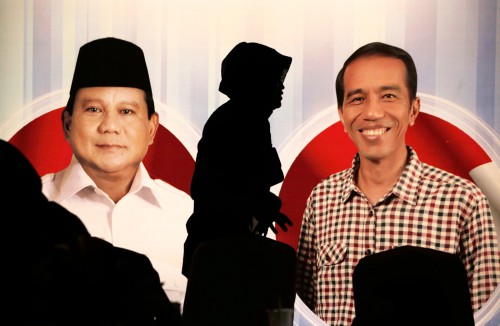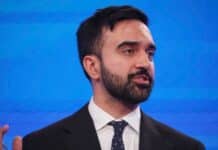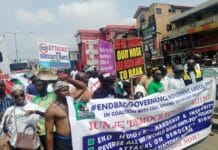Yet again the numbers refusing to vote exceed votes for the winning party
Conor Flynn, Socialist Party
On July 9, for only the third time since the collapse of the totalitarian Suharto regime in 1998, Indonesians went to the polls to elect a new president. As the incumbent president, Susilo Bambang Yudhoyono, was constitutionally barred from seeking a third five-year term, the election was contested between Suharto-era general Prabowo Subianto and Jakarta governor Joko ‘Jokowi’ Widodo.
After a fortnight of counting, the General Elections Commission (KPU) declared Jokowi the winner of the presidential poll. Jokowi received 70.6 million votes, or 53.15%, compared to Prabowo’s 62.5 million votes, or 46.85%.
Prabowo, however, is not conceding defeat. He has rejected the KPU’s official results declaring they are “legally flawed.” Prabowo has also withdrawn from the vote counting process. Although his campaign manager, Hashim Djojohadikusumo, told the media that polls suggesting Jokowi had won were “a hijacking of democracy,” Prabowo is unlikely to challenge the result in the Constitutional Court.
President Yudhoyono called on both sides to “show restraint”. Throughout the country Yudhoyono mobilised over 250,000 police, supported by 30,000 military personnel, to “keep guard so that the political and democratic process can run peacefully, orderly and safely.”
The presidential election has exposed the political instability that pervades Indonesia and the rest of the capitalist world. With a slowing economy, declining foreign investment and rising inequality, there will be no honeymoon period for the new president.

Disillusionment
Despite the transition from the military dictatorship of Suharto in 1998 to a parliamentary democracy, issues of endemic corruption and rampant increases in the cost of living remain. Poor living standards, the lack of infrastructure and public services have been largely ignored by the political establishment.
In the last three general elections, the number of votes gained by the winning party was lower than the number of people that protest against the political parties and leaders by not voting.
The April parliamentary elections reflected this mood. None of the parties that participated in the elections garnered enough votes or seats to stand a presidential candidate in their own right. The election rules require presidential candidates to have the support of a party of parties that secured 25% of the vote, or 20% of the seats in the parliamentary poll.
Grand coalitions of the political establishment, most of whom had close ties to the former Suharto regime, were formed. Jokowi was nominated by the Indonesian Democratic Party of Struggle. Renowned for his ‘hands on approach’ as mayor of Solo from 2005 to 2012, and later as governor of Jakarta, Jokowi was endorsed by several parties.
Key figures of the political establishment, such as former president Megawati Sukarnoputri, former commander of the Indonesian army Wiranto, and Liem Sieo Lion, the richest person in the country backed his candidacy.
Prabowo, backed by Gerindra – a party he formed in 2007 – also received the support of Golkar, the political party of Suharto. Despite being one of the richest people in the country – his fortune is estimated to be worth US$160 million – Prabowo was endorsed by a number of trade unions including the Federation of Metal Workers’ Unions (FSPMI). In return for the FSPMI’s endorsement Prabowo would have appointed its leader, Said Iqbal, as his minister for labour had he been elected.
National general strikes in 2012 and 2013 showed the huge economic power of the working class. If organised both industrially and politically it could challenge capitalism and the rule of profit. Unfortunately rather than moving towards building an independent political organisation of the working class the Indonesian Council of Trade Unions opted to stand 40 candidates for several different political parties.
Both Jokowi and Prabowo vowed to end corruption and cronyism, improve health and education, and deliver better public services. Both pledged to invest upwards of US$60 billion in major infrastructure projects like roads, ports and railways in an attempt to arrest Indonesia’s economic decline. In the first quarter of 2014 economic growth has slowed to 5.91%, its weakest since 2009.
While their policies were similar there were a number of stylistic differences. Whereas Jokowi presented himself as a ‘man of the people’; a man viewed by The Economist as the only candidate who could implement “real change”; Prabowo, in the words of the Financial Times, “represent(ed) more of the status quo.”
During the campaign Prabowo initially denied that, as commander of covert forces Kopassus during the 1998 mass protests against Suharto, he kidnapped, tortured and electrocuted 23 people. Although 9 people were later released 14 people were never found.
What next?
Jokowi’s victory has been welcomed by international markets and foreign investors. In a period of renewed economic crisis, capitalism can only continue in Indonesia by demanding more sacrifices from the working class and the poor. In June, the World Bank released its latest report regarding the Indonesian economy. Titled ‘How Can Indonesia Avoid the Middle Income Trap?’ the report recommended “deeper structural reforms, such as fuel subsidy reform” (i.e. cuts) is required if the country is to “share prosperity more broadly.” The outgoing Yudhoyono government has already begun this process by announcing that it will cut 2014 spending by US$3.7 billion.
The incoming vice president, Jusuf Kalla, has accepted the demands of the World Bank. Kalla has declared that reducing fuel subsidies will be the first priority for the Jokowi government. By announcing the decision “in good time and with good style”, Kalla, whom served as Yudhoyono’s first vice president from 2004 to 2009 and oversaw deep cuts to fuel subsidies, hopes the reforms will not “spark any protests.”
To achieve these reforms, Jokowi will require the support of Golkar, the second largest party in the parliament. Despite supporting Prabowo’s bid for the presidency, Golkar officials have indicated their distaste for opposition, having been in government for the past decade.
Although Indonesia became an independent nation in 1945 and formal, parliamentary democracy has been in place since the fall of the Suharto regime, none of the major problems facing workers and the poor have been solved.
Just as under Suharto, a tiny minority continue to plunder the country’s wealth and resources. In 2013, Forbes magazine revealed that the 50 richest people in Indonesia have a combined wealth of US$95 billion. US$36 billion of that wealth is controlled between nine families that have close ties to the former Suharto regime. The top 20% of the population control 80% of the country’s wealth. Wealth inequality continues to increase with even the United Nations warning this is a precursor to social unrest.
Neither Jokowi nor any of the establishment parties have a programme that is capable of taking things forward. The only way to lift the majority of people out of poverty, to end corruption and raise living standards, is on the basis of democratic socialism. Workers and the poor need to reject all of the capitalist parties and fight for a system that puts their interests first.




